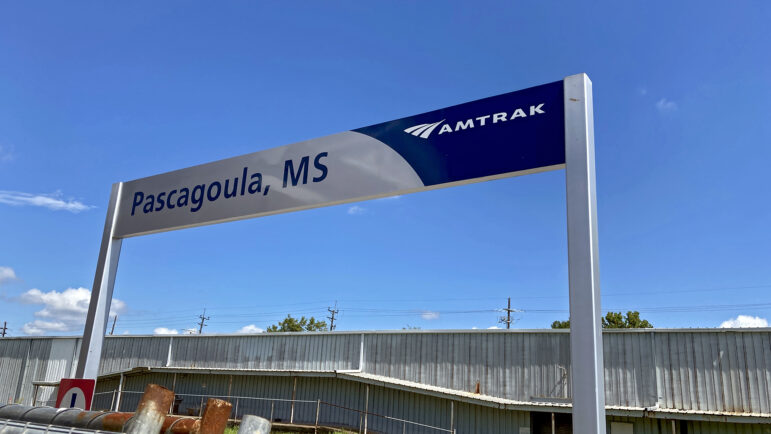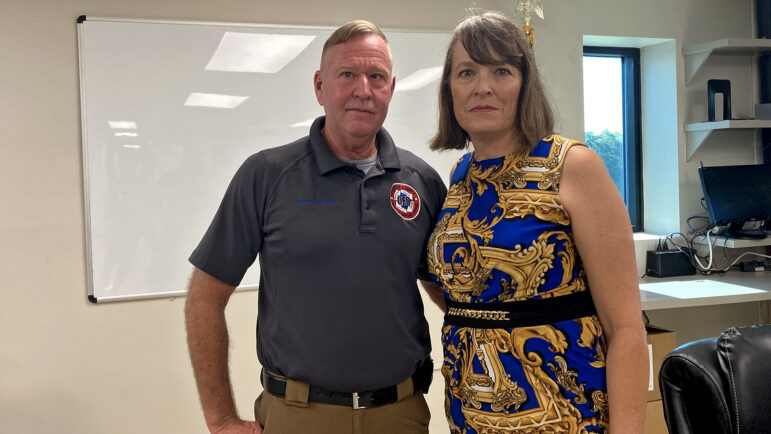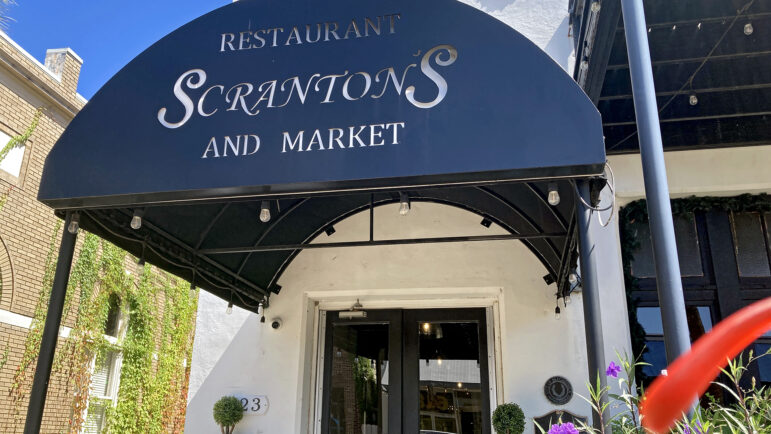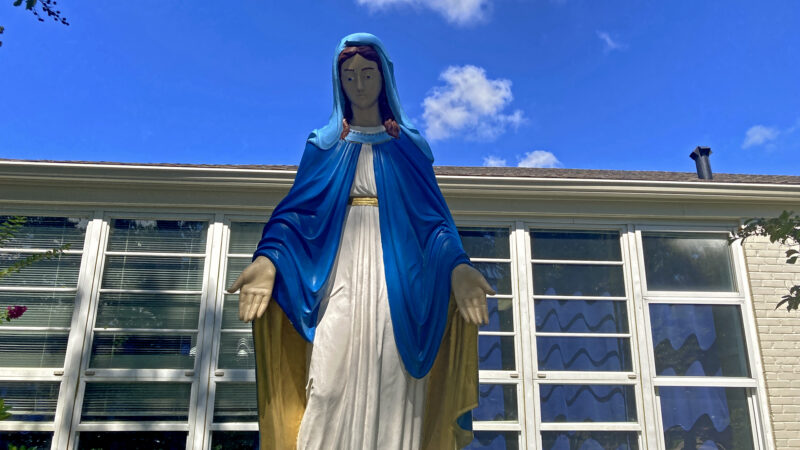Pascagoula still shows Hurricane Katrina’s heavy toll in Mississippi 20 years later
A statue of the Virgin Mary stands outside of Our Lady of Victories Catholic Church in Pascagoula, Mississippi, on Aug. 14, 2025. During Hurricane Katrina, Paige Roberts and others in Pascagoula watched from the safety of the courthouse as the water rose up on the statue. She said they knew the water was beginning to recede when it dropped below her belt.
Twenty years ago, Hurricane Katrina destroyed much of the Gulf Coast, including parts of the railroad that Amtrak ran a commercial line on, connecting New Orleans to Mobile, Alabama.
In mid-August, Amtrak resurrected this route — now dubbed the Mardi Gras Service. The Gulf States Newsroom’s Stephan Bisaha took part in the route’s inaugural trip.
Along the ride, he visited three coastal Mississippi cities that the route makes stops at to tell the story of how Katrina changed the Gulf Coast, and how these towns have worked to rebuild over the past two decades.

New Orleans rightly got the bulk of attention in Hurricane Katrina’s aftermath — and still does when looking back 20 years later — due to man-made issues, like the levees breaking.
But when it comes to the worst of the actual Category 3 storm, that was saved for coastal Mississippi.
In Pascagoula, Mississippi, which is as far east from New Orleans as any Mississippi city on the Gulf Coast gets, more than 90% of the city was flooded.
“It flattened just about everything,” Paige Roberts said. “And if it didn’t flatten it, it lifted up and moved it.”
Roberts is the president and CEO of the Jackson County Chamber of Commerce, where Pascagoula is the county seat. During Katrina, she was the executive director of the Southeast Mississippi Chapter of the American Red Cross.
The footprint of Katrina’s wrath was 93,000 square miles — almost exactly the size of Great Britain. Mississippi was mostly on the northeast side of the storm, also known as the “dirty side.” Hurricanes rotate counterclockwise, so the winds coming from the west side of Katrina swept across the Gulf and then dragged that water north into Mississippi’s coastal counties.
Terry Jackson, Jackson County’s emergency management operations coordinator, said that it looked like an atomic bomb had fallen on Pascagoula at the time.
“A lot of the federal assets were directed to Louisiana,” Jackson said. “And Mississippi was kind of forgotten.”

While much of the city was rebuilt over the past 20 years, it has never fully recovered. Today, Pascagoula’s population hangs a bit under 22,000 — about 15% lower than it was before Katrina. Part of the reason so many people chose not to return was the cost of rebuilding.
Residents blame FEMA for redrawing its flood maps in 2022, designating about 90% of the city to be in a flood zone — up from about 20% previously. While that might sound reasonable since it’s in line with how much of Pascagoula flooded during Katrina, residents said the designation put harsh and expensive restrictions on building and renovating homes.
“You’ve now made your building regulations and your insurance regulations based on one event that hasn’t happened like that before or since,” Alan Sudduth, then the Jackson County administrator and now the corporate affairs manager for Chevron in Mississippi.
New businesses opened and old ones were restored in Downtown Pascagoula, like Scranton’s Restaurant and Catering. Co-owner Richard Chenoweth stayed in his restaurant as it flooded during Katrina and watched as his refrigeration equipment floated in the Gulf waters. He spent the weeks after cooking whatever survived and giving it away to first responders and neighbors — from steaks to beans to burgers.

He said that the roughly 5,000 residents who didn’t return to Pascagoula were his customers, the ones who could afford to leave. Scranton’s still does well today, but he dreams about the non-stop rush of business he had pre-Katrina.
“Back then, as soon as a table vacated, there were people sitting at it,” Chenoweth said. ”Best time of my life.”
This story was produced by the Gulf States Newsroom, a collaboration between Mississippi Public Broadcasting, WBHM in Alabama, WWNO and WRKF in Louisiana and NPR.
Mideast clashes breach Olympic truce as athletes gather for Winter Paralympic Games
Fighting intensified in the Middle East during the Olympic truce, in effect through March 15. Flights are being disrupted as athletes and families converge on Italy for the Winter Paralympics.
A U.S. scholarship thrills a teacher in India. Then came the soul-crushing questions
She was thrilled to become the first teacher from a government-sponsored school in India to get a Fulbright exchange award to learn from U.S. schools. People asked two questions that clouded her joy.
Sunday Puzzle: Sandwiched
NPR's Ayesha Rascoe plays the puzzle with WXXI listener Jonathan Black and Weekend Edition Puzzlemaster Will Shortz.
U.S.-Israeli strikes in Iran continue into 2nd day, as the region faces turmoil
Israel said on Sunday it had launched more attacks on Iran, while the Iranian government continued strikes on Israel and on U.S. targets in Gulf states, Iraq and Jordan.
Trump warns Iran not to retaliate after Ayatollah Ali Khamenei is killed
The Iranian government has announced 40 days of mourning. The country's supreme leader was killed following an attack launched by the U.S. and Israel on Saturday against Iran.
Iran fires missiles at Israel and Gulf states after U.S.-Israeli strike kills Khamenei
Iran fired missiles at targets in Israel and Gulf Arab states Sunday after vowing massive retaliation for the killing of Supreme Leader Ayatollah Ali Khamenei by the United States and Israel.








